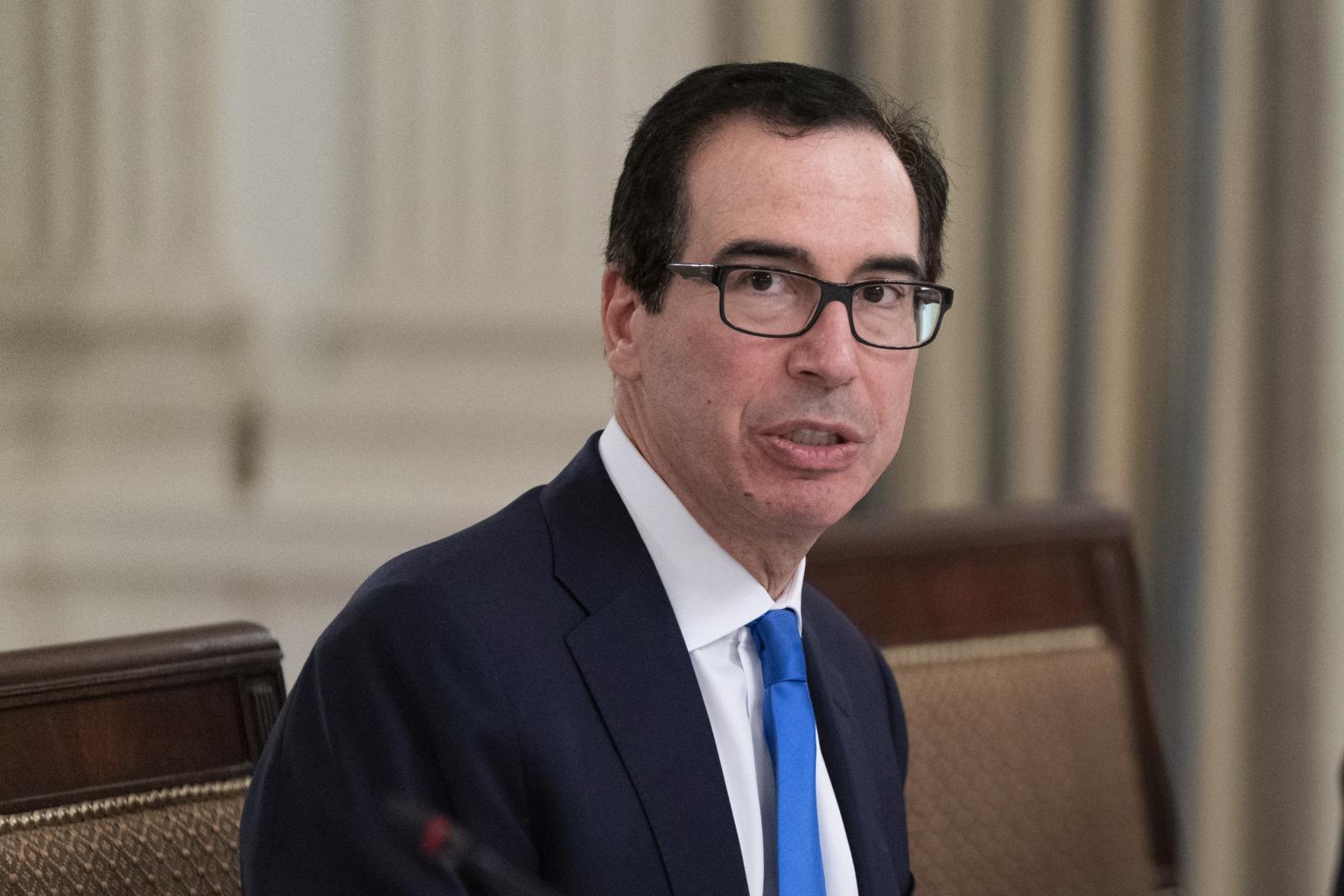Mnuchin feared sanctions would undercut US dollar, ex-Trump aide John Bolton says
Sign up now: Get ST's newsletters delivered to your inbox

US Treasury Secretary Steven Mnuchin said that the excerpts of the book he reviewed "are full of lies and factual inaccuracies".
PHOTO: EPA-EFE
Follow topic:
WASHINGTON (BLOOMBERG) - US Treasury Secretary Steven Mnuchin emerges as the chief opponent of the Trump administration's increased reliance on economic sanctions in Mr John Bolton's new book, worried that an over-reliance on such measures will weaken the global primacy of the dollar.
In encounter after encounter, President Donald Trump's former national security adviser describes Mr Mnuchin standing in the way of tough economic punishment - against Venezuela, Russia, China and others.
He feared other nations would stop using dollars and that the stress on the global financial system would be too great, Mr Bolton writes.
Mr Mnuchin argued that blocking others' access to the US financial system "would undermine the status of the dollar as the world's reserve currency and encourage others like Russia and China to conduct transactions in euros or through counter trade and other techniques," Mr Bolton writes.
An advance copy of Mr Bolton's book, "The Room Where It Happened," was obtained by Bloomberg News.
Although the book focuses on a scathing depiction of Mr Trump, who has called it a "compilation of lies," its claims about Mr Mnuchin highlight one of the biggest divides between Mr Bolton's hawkish foreign policy approach and that of many Democrats and some Republicans.
Mr Mnuchin said in a statement Thursday (June 18) that the excerpts of the book he reviewed "are full of lies and factual inaccuracies" and that "the Treasury Department has deployed our sanctions authorities with unprecedented effectiveness to address a broad range of threats."
As Mr Bolton makes clear, he sees sanctions as a key means to coerce other nations into doing what the US wants - even though withering sanctions regimes against Iran, Venezuela and Russia haven't brought the changes the US sought.
"Mnuchin argued that the constant use of sanctions, and the pressure we put on the international financial system would result over time in the tool's being weakened as states impacted by the sanctions sought to evade them," Mr Bolton says.
WITHERING ATTACKS
Among many past opponents and rivals Mr Bolton insults in the book, Mr Mnuchin comes in for particularly withering attacks. Mr Bolton derides him on matters large, such as standing in the way of numerous sanctions actions, and small, including his habit of taking frequent trips home to Los Angeles. The Treasury secretary is portrayed as crippled by a fear of negative press coverage.
"In the administration's early days, Mnuchin relished the publicity he received when imposing new sanctions, but when things got stickier and more complex, he became more and more jumpy," Mr Bolton writes.
Mr Bolton, who repeatedly misspells Mr Mnuchin's first name as "Stephen," gleefully recounts cases where Mr Trump overruled Mr Mnuchin, and mocks him for second-guessing policy decisions on Venezuela, China and other nations.
Mr Mnuchin's greatest sin, according to Mr Bolton, is his concern about the effect sanctions would have on the US economy, rather than thinking about the foreign policy goals Mr Bolton wanted the administration to achieve.
He describes a standoff over Venezuela sanctions in which Mr Bolton said his own view was that "Treasury was not entitled to its own foreign policy."
"As Commerce Secretary Wilbur Ross, (a renowned financier much more politically conservative than Mnuchin, who was basically a Democrat) said to me in April, 'Stephen's more worried about secondary effects on US companies than about the mission,'" Mr Bolton writes. "Which was completely accurate."
Mr Mnuchin's reluctance about sanctions has become a running theme in the Trump administration, with the Treasury Department - which is responsible for most sanctions actions - often the only voice in the room opposing such moves, according to people familiar with the matter.
They confirmed elements of Mr Bolton's account, saying Mr Mnuchin has expressed concern that heavy use of sanctions risks diminishing the primacy of the dollar and encourage other nations to use euros or the Chinese yuan more often.
"Treasury treated every new sanction decision as if we were prosecuting criminal cases in court, having to prove guilt beyond a reasonable doubt," Mr Bolton writes. "That's not how sanctions should work; they're about using America's massive economic power to advance our national interests."
But Mr Mnuchin said in his statement Thursday that "Treasury has targeted more rogue regimes, human rights abusers, terrorist organisations and other malign actors than any other administration - and we have done so in continual and close coordination with the State Department."
RECOUNTING LOSSES
Mr Bolton writes with relish about times the Treasury secretary lost arguments about sanctions and tariffs.
"Trump said to Mnuchin, 'You talk too much. Don't be scared Steve,'" Mr Bolton recounts of one episode when Mr Mnuchin blanched at the idea of slapping billions of dollars in tariffs on China.
Another time, when Mr Mnuchin lost an argument over punishing Huawei Technology Corp, MrBolton writes: "Mnuchin wouldn't give up but was finally overwhelmed, saying snippily to Trump, 'I gave you my advice, and you followed the wrong person.'"
Mr Mnuchin remains one of the longest-serving administration officials, and Mr Bolton offers a reason why: For all the administration's sanctions actions, Mr Bolton writes that Mr Trump agrees with Mr Mnuchin's reluctance to employ them too often.
"Commentators remarked periodically how often the administration resorted to sanctions and tariffs as instruments of national power," Mr Bolton writes. "The real story was much more complex, primarily because neither Trump nor Treasury Secretary Mnuchin was interested in, or willing to pursue a sanctions policy with resolve and consistency."

